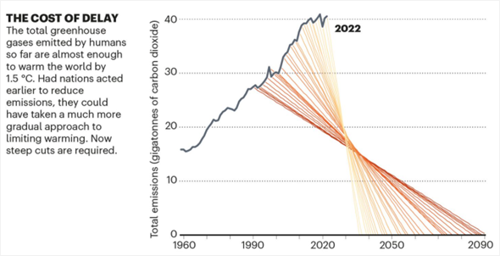Dubai, UAE is the host of this year’s Conference of the Parties (COP) summit, or UN climate change conference – an annual meeting where world leaders, environmental experts, activists and more come together to assess current progress towards dealing with the climate crisis.
Unfortunately, COP28 is happening during a year where globally, we’re seeing record temperatures, extreme weather, and continually rising greenhouse gas emissions. Before last year’s summit, UN Secretary General António Guterres’ said, “We are in the fight of our lives, and we are losing. Greenhouse gas emissions keep growing, global temperatures keep rising, and our planet is fast approaching tipping points that will make climate chaos irreversible”. This is still true today.
Still some progress being made
Last year’s conference, COP27, led to the creation of a ‘loss and damage’ fund, to help provide funding to those countries (mainly developing nations) who experience the worst effects of climate change. And this year, it was seeded with $420m in pledges, with more than half coming from the EU.
COP28 also includes the first formal ‘Global Stocktake’. Now, signatories to the Paris Agreement (signed at COP21 in 2015) must show the progress they’re making towards achieving the agreement’s goals, through their nationally determined contributions (NDCs).
The longer the delay, the sharper the cuts
The Paris Agreement’s goal is for every signatory country to become net zero by 2050. This would mean limiting temperature rises to well below 2oC above pre-industrial levels, and ideally below 1.5oC. This is to try and mitigate the worst impacts of climate change. But with each year that passes, the Paris Agreement goals become ever harder to meet and demand more extreme action.
This is reflected in this chart from an article in Nature by Jeff Tollefson. The trajectory shows we would have had almost 100 years to meet our target if we’d started to cut emissions following the Rio Earth Summit in 1992. But because we delayed, we only have around 12 years to meet the 1.5oC target.

This highlights the need for action at these conferences, as with each year that passes, meeting the goals seems less achievable.
Conflicts of interest
There’s added controversy this year. The host nation, the UAE is a large fossil fuel producer and exporter, and the COP28 President, Sultan Al Jaber, is Head of the Abu Dhabi National Oil Company. There’s also reports the hosts are using their role to discuss new oil and gas deals, with Al Jaber stating in his opening remarks that ‘we must look for ways and ensure the inclusion of the role of fossil fuels’ in the transition to net zero. And the Saudi Arabian Energy Minister adding he won’t agree to a phase down of fossil fuels at this year’s summit.
Net Zero needs the private sector
Putting conflicts of interest at this year’s meeting aside, the transition to net zero needs the public and private sectors to work hand in hand. Initiatives like the Task Force on Climate Related Financial Disclosures (TCFD), launched following the Paris Agreement in 2015, is a good example. It provides a framework for companies to disclose their emissions and how they’re managing climate related risks, giving greater clarity to their stakeholders so they can better understand climate related information across the economy. Perhaps improving the prospects of meeting the Paris Agreement goals.
What are Parmenion's plans?
At Parmenion we’re working with Normative to create our own net zero and TCFD plans. We’re assessing our emissions within our business and our investment portfolios. We’ll share our plan on how we’re going to reach net zero next year.
We asked Kristian Rönn, CEO and Co-founder of Normative to share his thoughts: “It’s so satisfying for Normative to work with Parmenion on their net zero journey. As well as measuring their full green house gas, including a complete picture of scope 3 emissions, the team is crucially looking beyond compliance. By exploring how to change business policies based on sustainability goals, Parmenion is opening the door to more impactful reductions that we’re excited to support them with."
Whether or not COP28 will be a success remains to be seen, but the case for meaningful action to limit climate change has never been greater.
https://www.unep.org/resources/emissions-gap-report-2022#:~:text=The%20world%20is%20not%20on,cent%20to%20avoid%20global%20catastrophe
https://www.nature.com/immersive/d41586-023-03601-6/index.html
This article is for financial professionals only. Any information contained within is of a general nature and should not be construed as a form of personal recommendation or financial advice. Nor is the information to be considered an offer or solicitation to deal in any financial instrument or to engage in any investment service or activity.
Parmenion accepts no duty of care or liability for loss arising from any person acting, or refraining from acting, as a result of any information contained within this article. All investment carries risk. The value of investments, and the income from them, can go down as well as up and investors may get back less than they put in. Past performance is not a reliable indicator of future returns.



